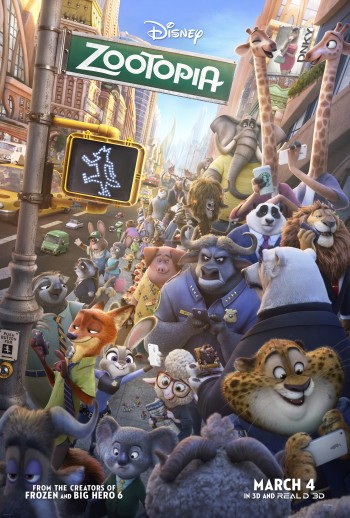
“Zootopia” is a pretty special Disney movie and one that I come to appreciate more and more every time I revisit it. Like “Robin Hood“, “Zootopia” has an entirely animal cast and is set in a universe where animals rule the Earth, giving it the freedom to delve into heavier or darker territory than usual for the studio without having to worry about alienating a human audience, and guaranteeing it a large furry fanbase.
This film is partially a parody of 80’s cop shows and buddy cop movies, gleefully embracing and subverting all the tropes and cliches of the genre – like the crazy, loose cannon cop who gets results, the reluctant criminal partner, the hard-boiled chief, the oily snitch, and the bloodthirsty mob boss. With its large total of supporting characters, the film also has fun playing with animal stereotypes, with a line-up consisting of a chubby cheetah, an apathetic elephant and a speedy sloth. The writing in the screenplay is enjoyably sharp and surprisingly unpredictable at times, with twists like Belleweather, the film’s antagonist, bailing Judy out on one occasion or Judy’s random act of kindness towards Fru Fru, the daughter of a mob boss, boomeranging back to her in a big way later helping to keep the movie feeling fresh and oh so satisfying.
I think a large part of the appeal of this movie is just how relatable it is. A lot of Disney movies are coming-of-age stories, where the protagonists are at a point where they’re ready to leave their adolescence behind, and “Zootopia” goes one step further than that. This movie is about young adulthood. It’s about putting yourself out there in the world and having new experiences without the safety net you’ve grown used to, for better or for worse. A lot of people can probably relate with having been bullied in their childhood and having to deal with the scars of that even into adulthood, or having to work hard to get where they are only to not be respected for what they do, or overzealously biting off more than they can chew.
“Zootopia” is also a film about prejudice, with the conflict and tension between prey and predator often acting as multifaceted allegories for sexism, racism, and homophobia. They have their parallels with human issues but they wisely never fit the mold entirely and can easily be interpreted as representing more than one different issue at a time. When dealing with such a lofty subject matter in a family film, things could get preachy or one-sided really easily, but I’m ultimately very satisfied with the egalitarian way “Zootopia” handles its message. It acknowledges that while it’s tempting to want to blame one group for all the world’s problems (usually while ignoring one’s own shortcomings), prejudice is something that’s complicated and messy – it can come from anyone and it’s always harmful. “Zootopia” does this by having Judy’s own ignored biases only make the problem worse as the second act twist, and having the supposedly meek sheep, Belleweather, be the culprit behind trying to start a species war in Zootopia.

In the pantheon of 80’s cop show characters, Judy Hopps is the loose cannon cop who does crazy stuff but gets results nonetheless. In order to find a missing man, protect the people of Zootopia and save her job, Judy does a number of dubious things throughout the movie, like blackmailing small-time crooks, breaking and entering, and using her newfound connections to the mob. I kind of like that while she is truly a force for good, she also has no problem operating in shades of grey – it gives her character an edge and helps her to feel well-rounded.
Judy is a small town girl who worked her tail off to get through the police academy, and has left home for the big city to follow her dreams. She’s the first bunny cop and a trailblazer for her species, which naturally comes with a set of challenges. The other, larger mammals on the force are condescending towards her and only think of her as a diversity hire, so she has to prove herself to both her boss and her coworkers. Judy is an idealist and an optimist; she has good-intentions but she’s also somewhat naive. When she comes to Zootopia, the place she’s idolized since she was a child, she thinks it’s a progressive paradise with endless potential, and in a lot of ways it is that, but it’s also a city with a massive population of diverse animals (with attitudes, to boot), meaning that there is a large speciesism problem. Still, Judy is plucky and determined – nothing will stop her from doing her job and helping people who need her. She’s sharply intelligent and she has a great amount of empathy for other people – it’s the reason why she joined the force.
What makes Judy a great character is that while she’s intended to be a role model figure, she is also far from perfect, which means she feels human and she has plenty of room to learn, grow and improve. While she wants to be a fully mature and responsible adult, she keeps things from her parents to save face, and she can’t quite help engaging in a childish feud with her fox nemesis, Nick – the two of them getting some sweet, escalating payback on each other – before they become friends. She can be a bit impulsive, and her tendency to not look before she leaps leads to her causing plenty of property damage in pursuit of one crook, badmouthing a mob moss when she has no leverage or authority at the time, and blowing up almost all the evidence she needs trying to get it back to headquarters.
Judy being a loose cannon cop has both its setbacks and its benefits. Judy’s biggest flaw though is her deeply ingrained biases against foxes, which came about partly as the result of her parents’ own prejudices but mostly because a fox bully attacked her when she was just a kid and traumatized her. Early in the film, it’s shown that while Judy wants to be more progressive and open-minded than her parents and does try to be so, she can’t quite bring herself to practice what she preaches, which you just know is going to bite her in the backside at some point (and it ends up happening at the worst possible time). Having played right into Belleweather’s paws and widened the division between predator and prey in Zootopia, Judy is driven to try even harder to solve the Nighthowler case and atone for her mistakes. By this point, Judy truly values Nick as a friend, so her final arc in the movie involves her overcoming her fears and literally trusting the loyal, unscrupulous vulpine with her life.
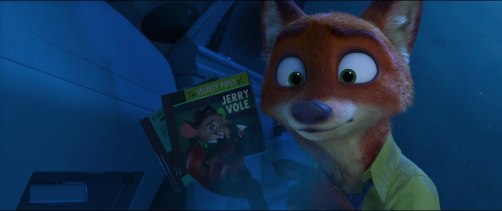
Nick Wilde is the plucky cop’s reluctant, criminal partner. Nick is a professional con man and a professional troll with a crafty mind, shifty demeanor and droll personality. Nick is initially very aloof and sarcastic, with a biting sense of humor and a slick charm to him. In contrast to Judy, the eternal optimist, he has a very cynical, nonplussed and almost bitter outlook on life. Before character development sets in, he’s also quite haughty. Judy pisses him off for a number of reasons during their first couple of confrontations, managing to touch a few sore spots, so he seems to enjoy verbally knocking her down and repeatedly humiliating her. In some ways, Nick is a smug bully she butts heads with during her first few days in Zootopia, and another obstacle for her to overcome.
When Judy wrangles him into helping her on her case, a silly, passive-aggressive and very humorous feud breaks out between the two with each of them trying to see how much they can make the other suffer. Nick finally chills out after they have a close shave with mob boss, Mr. Big, where Judy saves both their butts. After Judy saves his life a second time and he learns how bad she has it at work, he starts to gain respect for her. Nick reveals that, like Judy, he was a victim of bullying and harassment as a kid and got traumatized pretty badly by it. He is in fact the darker mirror to Judy. Growing up, Judy faced abuse and disdain, but she decided to work hard and overcome that. Growing up, Nick had it beaten into his head that no one would ever accept him for being a fox, so he decided to abandon his dreams and conform to animal stereotypes by becoming a criminal.
Before now, Nick has only tagged along on Judy’s adventure because she was blackmailing him, but at this pivotal turning point in his character arc, he comes to realize that Judy is not only a match for him, she’s also a true underdog. Instead of wanting to tear her down, he now wants to see her succeed and prove everyone wrong about her, prove that animals aren’t held back by who they are. At this point, Nick and Judy begin to actually cooperate and trust each other and as a result, they make a lot of progress and gradually become friends (at least until she unwittingly betrays him later, but they make up).
Nick, ironically, had a very narrow worldview beforehand, so throughout this movie he’s learning, just as much as Judy is. He’s been thrown out of his comfort zone into all sorts of unfamiliar situations and attitudes, so he has to roll with the punches, fall back on all his wits and instincts, trust Judy to have his back and try to have hers as well. Nick, naturally, becomes a more likable character in the process, settling into the role of the lovable rogue. We learn that Nick Wilde at his most laidback and trusting is actually surprisingly childish and goofy, with a fondness for all the little things in life, and his instincts as a conman are very compatible with detective work and conspiracy theories. Amusingly enough, Nick is also far less eager than Judy to throw himself into life-threatening situations, because he knows he’s the clever, cunning one of the duo not the tough one. Still, he does wind up stepping up to save Judy’s life during the climax. Ultimately, Nick proves the courage, loyalty and desire to do good he had as a kid haven’t been entirely lost, and by the end of the film, he’s decided to follow Judy’s example and take a level in optimism – deciding to try to be the first fox cop.
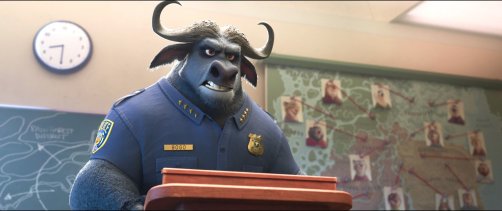
Officer Clawhauser is Judy’s overweight but sociable co-worker. Clawhauser is at first the only real friend she has on the force, and it’s clear that his friendly demeanor is the reason why he’s in charge of manning the front desk at the police station. He’s a bubbly, fun-loving, exuberant and effeminate man, who’s outgoing to the point of insensitivity at times, and is a total fanboy of Gazelle. Clawhauser is one of the most fun characters in this movie, which makes it effectively jarring when we see him being quiet, depressed and dejected because the species war in town has cost him his job. It’s an excellent indication of just how bad things have gotten at this point.
Chief Bogo is the hard-boiled police chief of 80’s cop shows, a burly cape buffalo with a thick British accent (perhaps the second largest case of furry bait in this movie after Nick). Bogo is very stern, strict, tough, and thoroughly masculine. He’s somewhat humorless and cynical, and he won’t stand for insubordination from his officers. He’s shown from the start to be very biased, as he’s condescending towards Judy and outright dismissive towards Nick, and when he’s pushed he can be very, very harsh and unfair. Still, crafting one-dimensional antagonists is not the way “Zootopia” does things, so Bogo is not without his redeeming qualities. Unlike Lionheart and Belleweather, he is not actually a corrupt cop and does care about the city. When Judy proves herself and earns his respect, he makes good on his word and keeps his promise to her. He also shares Clawhauser’s love of Gazelle as a running gag, so he’s not purely testosterone. By the end of the film, Bogo is shown to have become more even-handed and open-minded, growing into a better police chief as a result of Nick and Judy setting a good example for cops everywhere.
Mayor Lionheart is nice example of your typical self-involved politician. He’s impatient, short-tempered and vain, and he takes his employees for granted, unknowingly helping Belleweather to fall off the slippery slope of sanity. It turns out Lionheart is rounding up the savage animals in Zootopia and trying to cover up the epidemic of animals turning savage, partly to protect his position and partly to keep things from getting worse. He serves as a nice red herring in the mystery, and after his imprisonment, he makes for an excellent scapegoat for Belleweather. Later, he seems to be taking his newfound stay in prison well. Personally, I think he’s amused that his former assistant went and got herself into even bigger trouble than he did. Lionheart is voiced by J.K. Simmons, who between “Gravity Falls”, “The Legend Of Korra”, “Zootopia” and Kung Fu Panda 3″, seems to be everywhere in the medium of animation these days.
Mr. Big is a pastiche of your stereotypical mob boss straight out of “The Godfather”, “Goodfellas” or “The Sopranos”, but with the twist that he’s a tiny shrew, but is no less intimidating. With a quiet demeanor, a bloodthirsty nature, and an over-the-top Italian accent, he, his daughter, and his minions are hilarious. The temporary alliance between Judy and Mr. Big has to be one of my favorite plot twists in the movie, because Judy seems way more blase about it than you’d expect her to be.
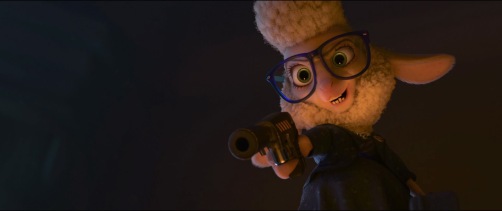
A recurring threat in the film, foreshadowed from the very first scene, are ‘savage’ animals; creatures that have devolved into an unthinkingly primal and predatory state. They’re feral, beastly, vicious and merciless, and the animation for them is downright creepy and nightmarish. The audience is initially led to believe that the condition might be a contagion or a zombie-like virus, easily spread through injuries like Mr. Manchas’, which inspires paranoia about just how bad the epidemic is and just how quickly it will spread. It turns out not to be a force of nature or an abomination of science, but a malicious and calculated attack on predators. Going savage strips them of their cute qualities and anthropomorphic features, and causes them to become what every bigoted animal fears and believes them to be, making it easy to stir up hate towards their entire class.
The person behind all this of course is Assistant Mayor Belleweather. For most of the film, Belleweather appears to be meek, loyal, friendly, good-intentioned and unassuming. It’s a very good act, and every time I watch this movie I almost buy into it. Truthfully, she’s very spiteful, vicious and wrathful. While Nick and Judy’s traumatic childhood experiences helped to shape their life choices growing up, all the mistreatment Belleweather has received has driven her insane and she wants to start a full-on species war to take her revenge on predators as a class. I especially love how she pretends to be Judy’s friend and claims to be all about solidarity and camaraderie, but as soon as Judy gets in her way she throws her to the wolves (or should I say, the foxes), revealing that she only really cares about herself. Like Amon from “The Legend Of Korra”, Belleweather makes for a strong villainous analogue to a Tumblr activist who’s gone murderously insane, and her ultimate comeuppance of being stuck in prison with predators she can’t stand is very satisfying.
Judy’s parents, Stu and Bonnie Hopps, are rednecks – your classic rural farmers. They’re chatty, amiable, overprotective and quite often insensitive. They want fervently to protect Judy from the world, which is a bit difficult when your rabbit daughter wants to be a cop, and they make it no secret that they have their biases against foxes and predators. Judy finds them annoying, but she loves them nonetheless and they love her – enough to let her go and try to be supportive of her. Like Bogo, Stu and Bonnie have their own mini-arc in the background of the movie. With Nick and Judy setting a good example for prey and predator relations, Judy’s parents start to trust predators more and even do business with Judy’s former childhood nemesis, Gideon.
Gideon Grey is a rather nasty and brutal bully, with a much deeper voice than you would expect for an eight year old kid. The portly fox only has two scenes in the movie, but a tremendous amount of influence on the plot, since Gideon attacking Judy as a kid is what helps give her her fear of foxes later in life. He returns as an adult, impressively with an even deeper voice and thicker redneck accent, to offer Judy an apology. Reconciling with a reformed bully from one’s past isn’t exactly a new or surprising plot point, but it does remind Judy that people can change, which is one of the themes of the movie and something she really needed to hear at the time. I also always find myself feeling a bit curious about adult Gideon’s personality at the end of that short scene.
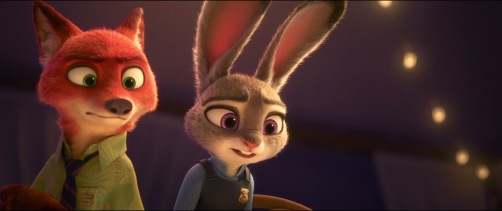
“Zootopia” is a remarkable example of how far and how quickly technology can advance, within only one decade (Disney first started working on CGI movies like “Dinosaur” and “Chicken Little” back during the post-renaissance era, a process of trial and error and refining the technique). This film has incredibly gorgeous and realistic animation that works on a micro and macro level, the peak so far of Disney’s 3-D efforts in the 2010’s, which it uses to bring the world of “Zootopia” to life. It’s a great fun to admire the city Judy has to moved to during her initial tour, and just as much fun to explore all the meticulous world-building that has been put into the city as their case drags the protagonists from region to region. The animals all live in different districts – tailor-made for them, their needs and their size – that equally resemble New York City as much as they do habitats in a zoo, all part of one huge biodome.
The lighting and color scheme for the film is warm, comforting and surprisingly homely, giving the overall movie an inviting ambiance, in spite of it’s frightening moments. The background animation for the nature scenes and the wildlife surrounding Bunny Burrow and Zootopia is so life-like and so methodically well-done that, if weren’t for the cast of cartoony, anthropomorphic animals inhabiting it, you could actually be fooled for a moment into thinking you’re watching a live-action film, which is very impressive. The score by Michael Giacchino (who has previously scored some of Pixar’s greats like “The Incredibles”, “Ratatouille” and “Up”) is snazzy, vibrant and memorable (particularly during Judy’s meter maid montage), and the film’s pulsating, sweeping signature song – “Try Everything” by pop star, Shakira – is placed in just the right place early in the film to make for a captivating experience.
“Zootopia” is another modern classic from Disney, and a surprising example of how a film’s story can be completely overhauled late in the game and still turn out great. Like “Frozen“, it’s one of my favorites from the 2010’s.
Rating: 10/10.
Side-Notes:

* We all know Judy achieved her dreams, but I wanna know how the tax exemptions kid turned out.
* “It may seem impossible to small minds, I’m looking at you, Gideon Grey” Young Judy throwing shade.
* Stu, Bonnie, your little girl is eight. You can save the dodgy career advice until she hits her teens.
* It’s played for laughs, but it is disturbing to learn that the “Zootopia” universe has pepper spray and tasers specifically designed to be used on foxes. All some poor fox has to do is startle someone by mistake and they can get shocked with a stun gun. I feel like this gag briefly harkens back to the original concept for “Zootopia”, where predators had to wear shock collars for the prey animals’ benefit.
* “Aw, that poor little bunny’s gonna be eaten alive”.
* The scene outside the ice cream parlor is amusing, since Nick and Judy are both being so phony in this chat. Nick is scamming her, and Judy is trying to hide the fact she profiled him for being a fox. Nick describes her as being ‘non-patronizing’ as a subtle jab, since he already knows she has the fox repellent.
* “I’m a loser!” Judy’s reaction is my own.
* “My mommy says she wishes you were dead”.
* “I am a real cop. I am a real cop. I am a real cop”.
* “Life isn’t some cartoon musical where you sing a little song and your insipid dreams magically come true! So, let it go!” Across time and space, every Disney princess out there felt really pissed off, and they weren’t sure why.
* “It’s called a hustle sweetheart” Sweet, sweet payback.
* “She hustled you. She hustled you good! You’re a cop now, Nick, you’re gonna need one of these! Hehe, have fun working for the fuzz!” I like you Finnick.
* Forget about Judy, keep your eyes on Nick during the sloth scene. His expressions as he puts Judy through the wringer are great.
* “Oh my god, the velvety pipes of Jerry Vole!”
* “Daddy, what did we say? No icing anyone at my wedding!” “He has to, baby. Daddy has to”
* I swear I could fill up this side-notes section with funny Nick expressions.
* “I learned two things that day. One: I was never gonna let anyone see that they got to me” “And two?” “If the world’s only gonna see a fox as shifty and untrustworthy, there’s no point in trying to be anything else”.
* Disney always chooses their voice actors well, but I really gotta point out how good Jason Bateman and Ginnifer Goodwin are as Nick and Judy, particularly during the scene where Nick talks about his backstory, where they both underplay their characters for a change.
* “I think Mayor Lionheart only wanted the sheep vote” The most savage quip in this movie.
* “You know, if I wanted to avoid surveillance because I was doing something illegal, which I never have, I would use the maintenance tunnel 6B, which would put them out… right there” “Well look at you, junior detective! You know, I think you’d actually make a pretty good cop” “Ugh, how dare you”.
* “You know, why don’t you go first, you’re the cop” Nick, you cowardly fox.
* To quote CinemaSins, Nick and Judy survive this.
* “Well, we think it might have something to do with their biology” That’s racist.
* “You catch any of that, Bon?” “Not one bit” “Well, that makes me feel a little bit better, I thought she was talking in tongues or something!”
* Daw.
* “Don’t stop, keeping going!” “No, no! Please stop!”
* Handsome ram.
* Nick and Judy also survived this.
* “It’s gone. We lost all our evidence” “Yeah, all except for this” I’m starting to love this fox.
* The first time I saw this movie, I was caught off guard by the Belleweather reveal and I missed a few things. I was confused how the cops arrived so quickly to apprehend her. The second time through, I was amused that she fucking called them herself when she was gloating and eagerly waiting for Nick to kill Judy. That’s karma, honey.
* “It’s called a hustle, sweetheart. Boom” Rule of three, baby.
* “Did I falsely imprison those animals? Well, yes. Yes I did. It was a classic ‘doing the wrong thing for the right reason’ kind of a deal”.
Further Reading:
- Nostalgia Critic; The Animation Commendation I & II; Animatedkid; Katejohns619; Silver Petticoat; Tor; Disney In Your Day; Jaysen Headley Writes; All The Disney Movies; Coco Hits NY; Healed1337; Evy Writes; Brenda Rochelle; Paul Selluoid; MoshFish Reviews; Up On The Shelf; The Entertainment Nut; Jamie’s Film Reviews; Same Kind Of Nerdy As Me; Rhyme And Reason; Melvyn Foo; Aambar’s Reviews; The Cinephile Files; Lesley Public Post; Jonesing For Films; Druidan’s ReviewsDruidan’s Reviews; Marian Thomas; Consequence Of Sound; Megan Kate; A Sky Of Books And Movies; Childers’ Pictures; Waldville; The Literary Omnivore; Broad Street Boys; Bad Feelings Reviews; Cinematic Frontier; Doctor Of Movies; Flix Chatter; Keeping It Reel; Alyx Writes; Jordan And Eddie; Natasha Stander; Milim On Movies; Movie Bob; Drogemeister.
Fanfiction:

- The Redemption Of Nicholas Wilde by Nightmage256.
- Born To Be Wilde by Beserker88.
- Assumptions by SashaDawn.
- Never by Bellatlas.
- Wilde Academy by AngeloFalcon.
- Stranger At Home by TheRealFanboy.
- Snowy Paws by GarrulousParakeet.
- The Worst Connection / The Not So Great Outdoors by RadRexKnuxFan.
- It’s Not Personal by SamurUmlal.
- Bad Cop by VarCapel.
- Of Foxes And Rabbits by TMNTfan4eva.
- A City Fox Goes Camping by OldGoat.
- Good Cops Like You by WildeNick.
- How Could Anyone Love A Fox Like Me? by Mr. Fallen Angel.
- Fox’s Guile / Into The Black / The Hunt by RedPen.
- The Gunfighter And The Lady by WinterWulf.
- A Study In Grey by Max Decoot.
- The Redemption Of Gideon Grey by YWFE.
- Anger Management by Helthehatter.
- Love In Bunnyburrow by Borneman.
- Finding A Family by Albmag.
- Musical Chairs by TMBrown.

Pingback: Wreck-It Ralph (2012) Review | The Cool Kat's Reviews
Pingback: Frozen (2013) Review | The Cool Kat's Reviews
A spot-on review of why this movie is as great as it is! And thanks for linking to my review, too!
LikeLiked by 1 person
“Zootopia” was a movie that gave me a lot to think about and digest when I was writing up this review, and I was glad to share yours – it was a lot of fun to read.
LikeLiked by 1 person
From a pure entertainment standpoint, this is a good movie. And you’re definitely right about its high quality visuals. I wasn’t a huge fan of the movie myself, but I get why a lot of people like it.
LikeLiked by 1 person
I’m not in love with the film, but I do like it enough. The nudist resort makes me a bit uncomfortable though, lol!
LikeLiked by 1 person
Oh yeah, the trip to the nudist club was pretty freaky. It’s strange, cause we the audience are used to naked cartoon animals, but Judy being uncomfortable makes us uncomfortable as well.
LikeLiked by 1 person
Pingback: Bolt (2008) Review | The Cool Kat's Reviews